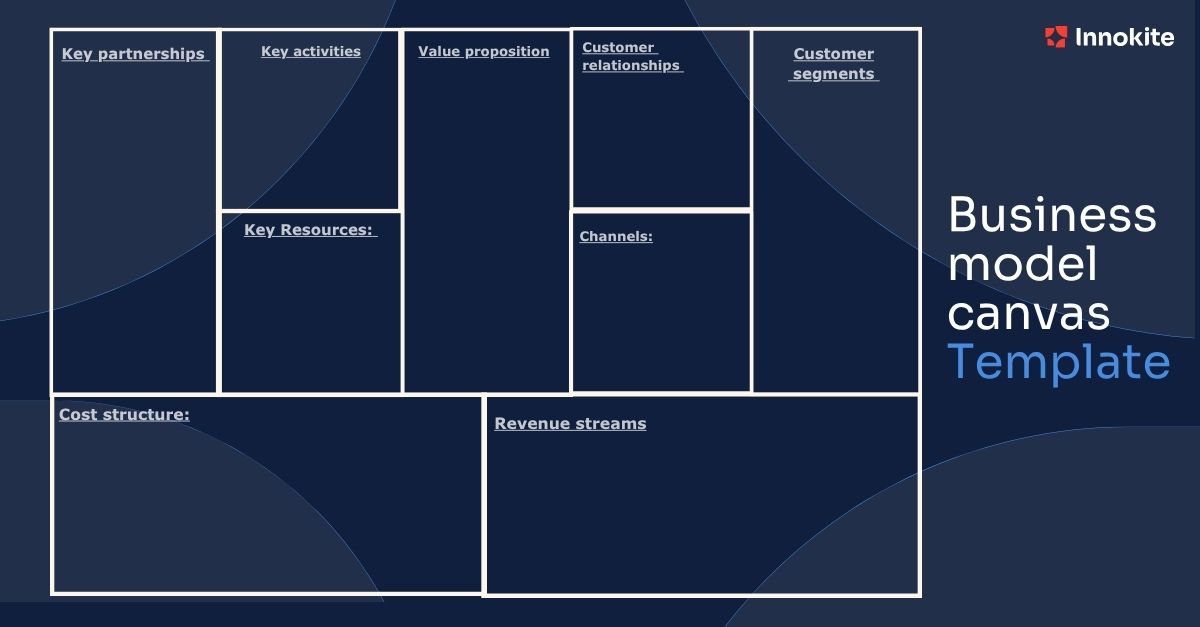A guide to take your entrepreneurial spirit to the next level: 5 essential skills to develop

Entrepreneurship isn’t just launching a startup: it’s a mindset, a skillset, and a journey. This guide covers 5 essential skills every aspiring entrepreneur should build to level up their game.
1. Define your objective with Business Model Canvas
Entrepreneurship without a clear objective is like sailing without a map. You may move fast, but you could drift far from where you intended to go. That’s why the first step in levelling up your entrepreneurial spirit is to define your objective with precision.
One of the most effective tools for this is the Business Model Canvas (BMC), created by Alexander Osterwalder and Yves Pigneur. Unlike a traditional 50-page business plan, the BMC offers a one-page visual map of your business model, making it easier to understand, test, and adjust (HBR, Strategyzer).
Why the BMC works:
- Clarity at a glance: You can see the entire business model in one place, making strategic gaps obvious.
- Flexibility: It’s simple to adapt as your market, customers, or offer evolves.
- Collaboration-friendly: Teams can brainstorm together, aligning vision and priorities quickly.

The BMC consists of nine building blocks:
- Customer Segments – Who you serve.
- Value Proposition – Why they choose you.
- Channels – How you reach them.
- Customer Relationships – How you engage and retain them.
- Revenue Streams – How you earn money.
- Key Resources – What you need to operate.
- Key Activities – What you must do to deliver value.
- Key Partners – Who helps you succeed.
- Cost Structure – Where your money goes.
Research shows that startups that use adaptable business models are more likely to succeed than those that don’t continuously test their assumptions (Boldare).
2. Know your customer through customer discovery
Great ideas don’t win by themselves, they win because they solve a real problem for real people. Step two is all about knowing exactly who your customer is and what problem they need solved.
This process is called Customer Discovery, popularised by Steve Blank’s Four Steps to the Epiphany and reinforced in Eric Ries’s Lean Startup. It’s the systematic approach of identifying, engaging, and deeply understanding your target audience before you build your product (HBS Rock Center, Future Founders).
Key practices in Customer Discovery:
- Define your Ideal Customer Profile (ICP): Go beyond age and location — include motivations, frustrations, and behaviours.
- Conduct empathy interviews: Ask open-ended questions about problems, not about your product idea.
- Map the customer journey: Identify pain points before, during, and after they might encounter your solution.
- Validate with data: Look for patterns across multiple conversations to avoid bias.
According to research from Harvard Business School, the most successful entrepreneurs spend significant time in customer discovery before finalizing their product concept, reducing the risk of launching something the market doesn’t want. (Cespedes, Eisenmann & Blank, 2012)
3. Build and refine for Market Fit
Once you know your customer’s needs, it’s tempting to build the “perfect” product right away. But research and countless startup failures show that’s risky. Instead, you need to build iteratively, starting with a Minimum Viable Product (MVP).
An MVP is the simplest, most basic version of your product that allows you to test your key assumptions with minimal cost. Dropbox famously started with a short explainer video to validate demand before building the actual software (Wired).
The MVP process:
- Prototype quickly: Build low-cost mockups or simple versions of your idea.
- Test with customers: Observe real interactions rather than relying solely on what people say.
- Iterate based on feedback: Make changes fast and often.
- Avoid perfection paralysis: Focus on learning, not flawless execution
Startups that iterate MVPs rapidly have a higher chance of achieving product-market fit within the first year. (3pillar)
.jpg)
4. Master your finances to build financial resilience
A great product can’t survive poor financial management. In fact, 82% of small businesses fail due to cash flow problems (Bank study). That’s why step four is mastering the numbers behind your business.
Core financial skills for entrepreneurs:
- Understand your burn rate: How much money you spend each month.
- Calculate your runway: How many months you can operate before needing more revenue or funding.
- Budget for growth: Allocate funds to marketing, R&D, and scaling operations.
- Track your break-even point: When your revenue covers all your costs.
Experts recommend separating personal and business finances early, forecasting regularly, and setting aside 10–20% of your budget for unexpected costs (Investopedia).
5. Learn to sell; your idea’s most powerful engine
Sales is the engine that powers every business. Whether you’re pitching an investor, persuading a partner, or closing your first customer, you are selling. And according to Babson College, entrepreneurs who master sales are better equipped to adapt and grow in competitive markets.
Sales principles for entrepreneurs:
- Know your value proposition: Clearly articulate why your offer matters.
- Listen more than you talk: The best sales conversations uncover the buyer’s needs.
- Tell compelling stories: Facts inform, but stories inspire action.
- Follow up consistently: Persistence often wins deals.
Strong sales skills do more than drive revenue, they improve your product by revealing what customers truly value (NASP).
Take your skills into action at Innokite Weekend!
Innokite Weekend is your chance to put these skills into practice. This fun hackathon brings researchers and students together to turn innovative ideas into real-world solutions in themes such as Energy, DeepTech, CleanTech, Water, and Health.
It’s a great opportunity for entrepreneurial students to explore entrepreneurship in a fun, practical way, and for researchers to see their innovative ideas and knowledge applied in real-world solutions.
Here’s what you’ll get:
- Draft your Business Model Canvas – Gain clarity on your startup idea and align your team quickly.
- Practice Customer Discovery techniques – Interview peers and potential users to validate real problems.
- Build and refine your MVP – Test, iterate, and improve your product before scaling.
- Master financial management – Learn budgeting and runway strategies to protect your startup.
- Practice pitching and sales skills – Present your idea to peers and mentors, and refine your messaging.
- Collaborate with a multidisciplinary team – Connect with innovators, mentors, and future co-founders.
- Enjoy networking and fun vibes – Enjoy meals, networking drinks, and an inspiring startup environment.
In just one weekend, you’ll compress months of learning into a hands-on, fast-paced experience that makes your entrepreneurial journey tangible and impactful.
Sign up now for the upcoming Innokite Weekend in November!


